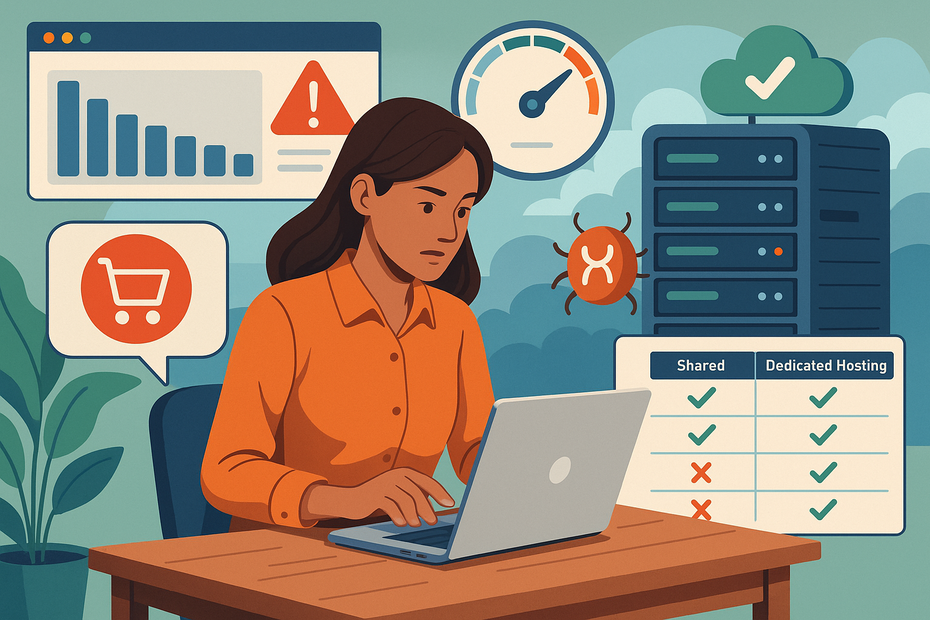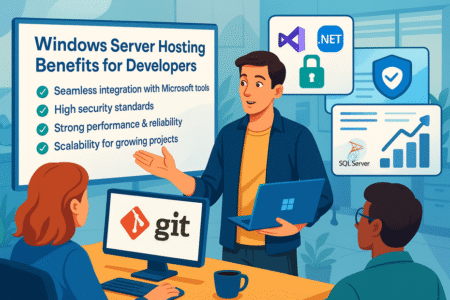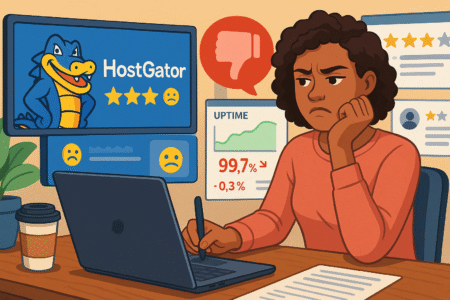Dedicated server hosting can completely change how your website performs, but how do you know when it’s time to make the switch? Is slow website speed driving away your visitors?
Are constant crashes costing you sales? Maybe you’re worried about security risks or limited control with your current hosting plan.
In this article, we’ll walk through the clear signs that show you it’s time to upgrade to dedicated server hosting—and why waiting too long could hold your business back.
1. Your Website Traffic Is Consistently Growing
When your website starts pulling in steady streams of visitors, it’s exciting—proof that your hard work is paying off. But here’s the catch: shared hosting often isn’t built for growth.
Dedicated server hosting steps in when traffic increases from “manageable” to “overwhelming.”
High Visitor Volume Overloads Shared Hosting
Shared hosting means you’re essentially splitting resources—like CPU power, memory, and bandwidth—with dozens (sometimes hundreds) of other websites. Think of it like living in a crowded apartment where everyone’s plugged into the same power grid.
When one site guzzles the electricity (or in this case, server resources), everyone else flickers.
If your website gets a steady stream of visitors—say, 50,000+ monthly visits—it’s not unusual to see load times crawl. In practice, this shows up as:
- Pages taking 5–7 seconds to load, even with simple content.
- Admin dashboards lagging when you try to upload media or update content.
- Hosting support blaming “too much traffic” for downtime.
Dedicated servers eliminate this bottleneck because all resources belong to you. Your traffic no longer has to fight for scraps.
Seasonal Spikes Push Your Site Offline
Traffic doesn’t always grow evenly. Retail sites get hammered during Black Friday or holiday sales. Bloggers see sudden surges when a post goes viral. If you’re on shared hosting, those unpredictable spikes can be brutal.
Imagine launching a flash sale at midnight, only for your checkout page to crash because the server can’t handle a 5x spike in visits. Not only does it kill sales, but it also hurts credibility. Visitors who see “Error 503: Service Unavailable” aren’t coming back.
Dedicated servers give you predictable performance, no matter how unpredictable your traffic is. You can even scale resources (RAM, bandwidth, processors) to prepare for known surges—something shared hosting doesn’t let you do.
Loss of Conversions From Slow Page Speeds
Traffic growth means nothing if visitors don’t convert. Every second counts—literally. A well-documented study showed that even a 1-second delay in page load can cut conversions by 7%.
If your checkout takes 4–5 seconds longer because your shared hosting is stretched thin, that’s money lost. I’ve seen clients running Facebook ads who paid for thousands of clicks, only to lose sales because their shared hosting server choked under the influx.
Dedicated servers prevent that painful leak. Faster load times mean:
- Higher conversion rates in e-commerce stores.
- Better ad ROI, since you’re not paying for wasted clicks.
- A smoother experience that keeps people engaged.
When growth is steady, performance is no longer optional—it’s mission critical.
See how HostGator’s dedicated servers handle traffic growth.
2. Your Site Performance Is Slowing Down
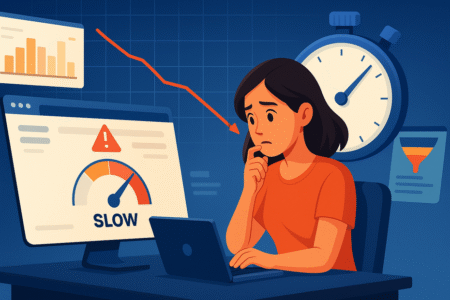
If your website feels sluggish, that’s not just annoying—it’s a red flag. Performance issues usually show up before major crashes, almost like warning lights on a car dashboard.
Dedicated server hosting ensures speed and consistency when shared hosting can’t keep up.
Shared Resources Create Bottlenecks
Shared hosting works like a public bus: cheap and functional, but slow when everyone piles on. If one site on your server gets a surge, your site slows down—even if your own traffic is stable.
This shows up as:
- Images that hang before fully loading.
- Login pages timing out when you try to access admin settings.
- Caching plugins doing heavy lifting but not solving the root issue.
Dedicated servers remove that “bus” scenario. It’s like owning your own car—performance depends only on you. With full CPU and RAM at your disposal, you don’t just mask performance issues, you eliminate them.
User Experience Suffers From Delays
Performance isn’t just about server metrics; it’s about real people trying to use your site. If someone clicks a product link and waits 6 seconds before anything happens, you’ve probably lost them.
Think about your own browsing habits. When’s the last time you waited on a slow site instead of clicking away? That’s exactly what your visitors are doing. A sluggish experience creates a ripple effect:
- Bounce rates climb because visitors don’t stick around.
- Session times drop, signaling to Google your content isn’t engaging.
- Returning visitors disappear because they’ve already lost patience.
Dedicated hosting flips that script. It creates a smooth, responsive environment where clicks feel immediate and browsing feels natural. That seamlessness builds trust without you having to say a word.
Page Speed Directly Impacts SEO Rankings
Google takes page speed seriously. Not just as a ranking factor, but as part of the overall “Page Experience” signals in its algorithm. If your site drags on a shared server, you’re essentially handing competitors an edge.
I’ve seen websites jump from page 3 to page 1 on Google simply by moving to faster hosting. It wasn’t new content or extra backlinks—it was pure performance improvement.
Here’s how speed ties directly to SEO:
- Faster pages get crawled more often by search engines.
- Mobile-first indexing penalizes sites that don’t load quickly on 4G connections.
- Core Web Vitals (like Largest Contentful Paint) improve when server resources aren’t starved.
Dedicated hosting gives you the technical foundation for SEO success. Without it, you’re like an athlete trying to compete in heavy boots.
| Feature | Shared Hosting | Dedicated Hosting |
| Resources | Shared with multiple websites | 100% allocated to your site |
| Speed Under High Traffic | Slows down or crashes | Stable and consistent |
| Security | Vulnerable to shared risks | Isolated, customizable control |
| Uptime | Often below 99% | 99.9%+ with SLAs |
| Best For | Small sites and blogs | High-traffic, mission-critical |
Explore SiteGround’s dedicated hosting plans built for speed.
3. Security Has Become a Serious Concern
If you’ve started losing sleep over hackers, malware, or customer data leaks, that’s a signal you’ve outgrown shared hosting.
Security isn’t just about peace of mind—it’s about protecting your business and reputation.
Shared Hosting Increases Vulnerability
On shared hosting, every website on the server is tied together behind the scenes. If one of those sites gets compromised, yours is suddenly at risk too. It’s a bit like renting an apartment where your neighbor never locks their door—once thieves get inside the building, everyone’s stuff is fair game.
In practice, you might notice:
- Random downtime caused by attacks targeting other sites on your server.
- Malware alerts that aren’t even from your own code.
- Hosting support shrugging and telling you to “install a plugin” as protection.
Dedicated server hosting cuts that risk. Your site lives on its own private environment, meaning no “bad neighbors” can drag you down.
Dedicated Servers Offer Advanced Firewalls
Here’s where things get interesting: with a dedicated server, you control how your walls are built. Many providers give you direct access to advanced firewalls, intrusion detection systems, and DDoS protection. That’s not something you get on a shared plan.
For example, you can configure your firewall rules to block suspicious IP ranges, throttle brute-force login attempts, or even whitelist admin access to a specific country. On shared hosting, those kinds of controls aren’t available—you’re stuck with one-size-fits-all protection.
I recommend setting up server-level firewalls instead of relying only on WordPress or CMS plugins. It’s like having a locked gate at the street, not just a lock on your front door.
Compliance Standards Require Stronger Protections
If your site handles sensitive data—like credit cards, medical records, or customer logins—you may fall under compliance standards such as PCI-DSS, HIPAA, or GDPR. These aren’t just fancy acronyms; they’re legal requirements with real consequences if you fail them.
Shared hosting usually can’t guarantee the level of isolation and logging required to meet these standards. For instance, PCI compliance for e-commerce often requires dedicated IP addresses, encrypted transmissions, and secure storage—all easier to achieve on dedicated servers.
From what I’ve seen, businesses often only realize this after a failed compliance audit. By then, it’s a scramble. Moving to a dedicated server before you need it keeps you a step ahead instead of playing catch-up.
Check out InMotion Hosting’s dedicated servers with advanced security.
4. You Need Full Control Over Server Settings
As your business grows, cookie-cutter hosting setups stop working. You need flexibility, whether that’s installing custom software, optimizing performance for your stack, or giving developers the access they need.
Dedicated hosting puts you in the driver’s seat.
Custom Configurations Improve Efficiency
On shared hosting, you’re stuck with whatever server configuration the provider decided works “for most users.” That usually means compromises. Maybe you can’t adjust PHP memory limits. Maybe your database is capped at a small size. Maybe caching options are locked down.
With a dedicated server, you can tune every detail:
- Increase PHP limits to handle resource-heavy apps.
- Adjust database configurations for faster queries.
- Allocate memory directly where your site needs it most.
I’ve seen small changes here—like optimizing MySQL settings—cut load times in half. The difference comes from having that freedom.
Root Access Allows Tailored Software Installs
If you’ve ever wanted to install custom libraries, specialized software, or a specific version of Python, shared hosting probably made you hit a wall. You don’t get root (administrator) access there.
On a dedicated server, root access is yours. That means:
- Installing any software or framework your project needs.
- Running scripts to automate maintenance.
- Managing cron jobs (scheduled tasks) without limits.
Picture it this way: shared hosting is like driving a rental car where you can’t even adjust the radio. Dedicated hosting hands you the keys to your own vehicle—you set it up however you like.
Development Teams Require Flexible Environments
If you work with developers, this one’s huge. Teams often need staging environments, custom testing tools, or containerized applications like Docker. Shared hosting just doesn’t allow for that level of setup.
With dedicated hosting, your team can:
- Create staging servers that mirror production.
- Run multiple environments for testing new features.
- Deploy updates faster using automation tools.
In practice, this means fewer deployment errors and less downtime. For businesses pushing out new features regularly—like SaaS platforms or online stores—this flexibility isn’t just convenient, it’s necessary.
| Feature | Shared Hosting | Dedicated Hosting |
| Server Configurations | Fixed, no customization | Full customization available |
| Root Access | Not available | Full root/admin access |
| Software Installs | Limited to host’s options | Any software, any version |
| Developer Tools | Rare or restricted | Full environment control |
| Best For | Beginners, small websites | Growing businesses, dev teams, SaaS apps |
See how Bluehost gives full root access on dedicated servers.
5. Your Current Hosting Can’t Handle Data Storage
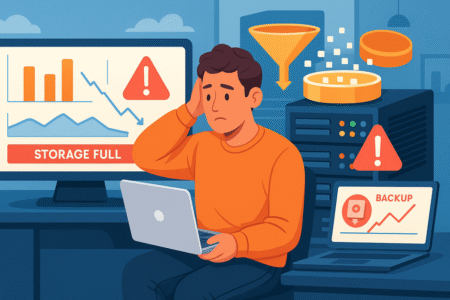
When your site starts to store more data—whether it’s customer accounts, product catalogs, or content archives—shared hosting begins to buckle.
Dedicated server hosting gives you room to grow without running into storage ceilings.
Growing Databases Strain Shared Resources
Databases are the beating heart of your website. Every product search, login request, or blog post query runs through them. On shared hosting, your database often lives on the same cramped server as dozens of others.
You might notice:
- Queries taking longer to return results.
- Dashboard search functions lagging.
- “Database connection error” popping up during high-traffic times.
I’ve seen e-commerce sites with tens of thousands of products grind to a halt simply because their MySQL database outgrew what shared hosting could handle.
Dedicated hosting lets you assign more RAM and CPU specifically to your database processes so they keep up with demand.
Dedicated Storage Ensures Scalability
The difference with a dedicated server is that storage scales with you. Need an extra terabyte? Add it. Want faster performance? Upgrade to SSDs or NVMe drives. Unlike shared hosting, you’re not fighting for scraps.
For example, if your business grows into managing thousands of customer profiles with high-resolution media (like real estate or photography), dedicated storage ensures you won’t hit arbitrary limits. It’s about planning for tomorrow, not patching problems today.
Backups and Recovery Are More Reliable
Shared hosting backups are usually limited to “once a day, maybe.” And restoring a backup? That often means filing a ticket and waiting. With a dedicated server, you decide how and when backups happen.
I suggest automating daily incremental backups and weekly full backups, stored both locally and in the cloud. That way, if a developer pushes bad code or your site gets corrupted, you can restore it in minutes instead of days.
6. Downtime Is Hurting Your Business Revenue
Downtime is more than just an inconvenience—it’s a direct hit to your bottom line. Dedicated servers provide stability that shared hosting simply can’t guarantee.
Frequent Crashes Damage Customer Trust
When your site keeps crashing, people don’t just leave; they lose trust. Imagine checking out at a store and the lights go out. That’s how it feels when a website fails mid-purchase.
On shared hosting, uptime is often around 98–99%. That sounds fine until you realize 1% downtime means more than 7 hours a month. For businesses, that’s an eternity.
Dedicated hosting typically comes with service-level agreements (SLAs) promising 99.9% uptime or higher—that’s less than 45 minutes a month.
E-Commerce Sites Lose Sales Quickly
If you run an online store, downtime isn’t theoretical—it’s lost revenue. A Shopify or WooCommerce site crashing during peak hours is like locking your doors while customers are lined up outside.
Here’s how downtime translates into losses:
- A site making $1,000/hour loses $7,000 from 7 hours of downtime.
- Cart abandonments skyrocket when checkout pages fail.
- Paid ads keep running while your site stays offline, wasting ad spend.
Dedicated servers protect against this by isolating your site’s resources. No noisy neighbors mean fewer surprise crashes.
Dedicated Servers Provide Higher Uptime Guarantees
Most reputable dedicated hosting providers back uptime with SLAs. That means if uptime drops below their guarantee, you’re compensated.
More importantly, you have proactive monitoring, redundant power, and better hardware keeping your site live.
It’s the difference between gambling on shared hosting and having insurance with dedicated servers.
7. You’re Running Complex Applications or Software
If your website has outgrown static pages and is now running heavy apps, specialized tools, or even games, shared hosting isn’t going to cut it.
Resource-Heavy Apps Demand More Power
Think about applications like CRMs, ERP systems, or analytics dashboards. These chew through memory and processing power. On shared hosting, they either won’t install or they’ll drag everything down.
With a dedicated server, you can allocate specific resources—like 32GB of RAM or multiple CPUs—to ensure those applications run smoothly. I’ve worked with companies that couldn’t even launch their reporting tools until they moved to a dedicated setup.
Virtualization and Custom Tools Need Dedicated Resources
If your team uses Docker, Kubernetes, or other containerized setups, forget shared hosting. You need root access and resource isolation to run multiple environments.
Dedicated servers make this possible. You can:
- Spin up virtual machines for testing.
- Run staging and production environments on the same server.
- Experiment with tools without risking the live site.
This flexibility is why development teams prefer dedicated hosting—it doesn’t cage their creativity.
Game Servers and SaaS Platforms Perform Better
If you’re hosting a multiplayer game, SaaS platform, or even video conferencing software, shared hosting is a non-starter. These require:
- Low latency.
- Consistent uptime.
- Massive resource allocation.
Dedicated hosting gives you the raw horsepower needed. For example, a game server running on a shared plan would crash under 20 concurrent users. On a dedicated machine, you can support hundreds, even thousands, depending on hardware.
Explore Hostinger’s dedicated hosting for demanding applications.
Pro Tip for Choosing Dedicated Server Hosting
Switching to dedicated hosting is a big move, so don’t just grab the cheapest option. I suggest looking for:
- Managed support: So you’re not left handling server updates at 2 a.m.
- Scalability: Options to add storage, RAM, or processors as you grow.
- Monitoring and security tools: 24/7 alerts, firewall configurations, and DDoS protection built-in.
- Location options: Servers close to your audience for faster speeds.
I believe the best providers aren’t just selling you hardware—they’re acting like partners in your business growth. The right dedicated server isn’t just about power; it’s about reliability, trust, and freedom to scale without limits.


